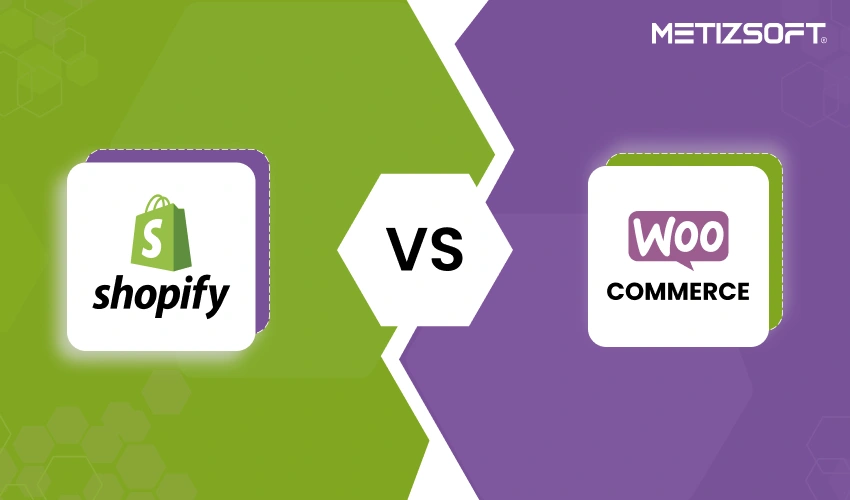
Table of Contents
Summary
In 2025, it is important to choose the right e-commerce platform for the growth and success of your online store. Shopify and WooCommerce dominate the market. However, it is important to understand their unique characteristics, capabilities, and costs to decide whether it is best for your business. This blog, Shopify vs. WooCommerce, dives deep into a comparison, covering everything to help you make an informed decision.
Introduction
As the eCommerce industry continues to thrive, picking the right platform for your online store is more important than ever. With Shopify and WooCommerce leading the market, it’s essential to understand which one offers the most value in 2025. Whether you’re starting a new business or looking to migrate, the decision between Shopify vs WooCommerce can shape your store’s success.
This Shopify vs WooCommerce comparison 2025 blog covers all the essential details from each platform, including cost, features, and scalability, to help you make an informed decision for your business. So, let’s dive into the details and decide which platform is truly the best eCommerce solution for your eCommerce business in 2025?
Shopify vs WooCommerce 2025: Current Market Stand
Shopify and WooCommerce have both been pioneers in the eCommerce space. Both constitute a significant share of the market. As of 2025:
- Shopify powers over 1.7 million businesses worldwide and holds a 30% share of the global eCommerce market.
- WooCommerce, a plugin for WordPress, powers over 5 million stores, making it the most widely used eCommerce platform globally.
Both platforms have seen remarkable growth since their inception, and their user base continues to expand as more businesses migrate to online commerce.
Shopify vs WooCommerce Features Comparisons
Let’s discuss and understand the core features of each platform to understand what they offer and how they compare.
Ease of Use
- Shopify: Shopify is a hosted solution. It’s incredibly user-friendly. With its flexible drag-and-drop interface, even beginners can set up their stores without any technical expertise.
- WooCommerce: WooCommerce is a WordPress plugin requiring a bit more technical knowledge. While the setup process is straightforward for those familiar with WordPress, beginners may find the learning curve steeper.
AI Adoption
- Shopify: Shopify is in charge of integrating AI into its platform. With features like Shopify Inbox (AI-powered customer support) and AI-based product recommendations, the platform is continually evolving to enhance customer experiences.
- WooCommerce: WooCommerce is still catching up with AI features. While AI-powered plugins are available, they don’t have the same level of AI integration as Shopify.
Website Builder Features
- Shopify: Shopify offers an easy-to-use website builder with customizable templates, various design options, and a seamless drag-and-drop editor.
- WooCommerce: Since WooCommerce is built on WordPress, it gives users more design flexibility, allowing them to choose from various themes and plugins. However, the customization process can be more complex.
Apps & Plugins Ecosystem
- Shopify: Shopify’s vast app store offers thousands of apps and integrations for everything from inventory management to marketing automation.
- WooCommerce: WooCommerce also has an extensive plugin ecosystem, thanks to its WordPress foundation. You’ll find plugins for nearly everything, but some might require technical expertise to install and configure.
Design & Themes
- Shopify: Shopify offers premium themes and customizable templates. While the themes are sleek and modern, customization is somewhat limited without technical expertise.
- WooCommerce: WooCommerce provides more theme options and flexibility. Because it’s built on WordPress, you can access thousands of free and paid themes and customize them to your heart’s content.
SEO & Content Marketing
- Shopify: Shopify has built-in SEO features like customizable title tags, meta descriptions, and URL structures. It also integrates with various marketing tools for content creation and promotion.
- WooCommerce: WooCommerce, being a WordPress plugin, is highly SEO-friendly. You can easily optimize your store with plugins like Yoast SEO making it a great option for content marketing and SEO.
Omnichannel Selling
- Shopify: Shopify excels in omnichannel selling. It lets you sell across multiple platforms, including Amazon, Facebook, Instagram, and more, all from a single dashboard.
- WooCommerce: WooCommerce offers omnichannel capabilities but may require additional plugins or third-party integrations to make it work seamlessly across platforms.
Customer Support
- Shopify: Shopify provides 24/7 customer support through live chat, email, and phone. They also have a large knowledge base and a vibrant community of experts.
- WooCommerce: WooCommerce relies on the support of its vast WordPress community and forums. However, customer support can be limited compared to Shopify’s dedicated service team.
Shopify vs WooCommerce Comparison 2025: Additional Differences
Hosting Included
- Shopify: It is a fully hosted eCommerce platform that includes hosting in the subscription plan. You don’t need to worry about finding a hosting provider.
- WooCommerce: WooCommerce is self-hosted, which means you need to choose your own hosting provider and manage server-related issues.
Custom Flexibility
- Shopify: Shopify is somewhat limited in terms of deep customizations. While you can modify the theme and add apps, certain customizations may require technical knowledge.
- WooCommerce: WooCommerce offers more flexibility when it comes to customization. Since it’s built on WordPress, you can access the code and tailor your store as needed.
Tech Maintenance
- Shopify: Shopify handles all the technical aspects, including updates, security, and hosting, allowing you to focus on your business.
- WooCommerce: You are responsible for managing updates, security, and maintenance in WooCommerce. This could be a downside for non-technical users.
Setup Speed
- Shopify: Shopify offers a quick setup with pre-configured templates and an easy-to-follow process. You can have your store live within hours.
- WooCommerce: WooCommerce requires more time to set up, especially when choosing hosting, installing WordPress, and configuring the WooCommerce plugin.
Out-of-the-Box Performance
- Shopify: Shopify’s performance is excellent right out of the box, with fast loading speeds and minimal setup required.
- WooCommerce: WooCommerce performance depends on your hosting provider, theme, and plugins. It may require optimization to perform at its best.
Shopify vs Bigcommerce Cost Comparison 2025?
Both platforms offer a broader range of pricing options, from free to advanced plans. Here’s a breakdown:
Shopify:
- Basic Plan: $39/month
- Shopify Plan: $105/month
- Advanced Plan: $399/month
You can pay additional costs for apps and themes you wish to use accordingly.
WooCommerce:
- Free (with WordPress)
- Costs for hosting, domain, themes, and plugins.
Which is better Shopify or WooCommerce for scalability in 2025?
Overall, both Shopify and WooCommerce offer unique advantages!
- Shopify is perfect for businesses looking for a fully managed, easy-to-use platform with excellent customer support, scalability, and a broad spectrum of built-in features.
- WooCommerce is best for businesses that want more flexibility, customization, and control over every aspect of their store and are comfortable managing the technical side of things.
As a certified Shopify Development Agency, we recommend Shopify for most businesses, especially those looking to scale quickly and seamlessly. It’s a platform designed for growth, with less technical complexity.
Final Takeaways
Choosing between Shopify and WooCommerce depends on your budget and unique business needs. Shopify offers a straightforward, scalable solution with a wealth of integrated features. WooCommerce, though more flexible, requires more manual effort and technical knowledge. No matter which platform you choose, both have the potential to power your business in 2025 and beyond.
If you are looking to start your eCommerce journey with Shopify, we are ready to provide end-to-end assistance. Reach out to us, your trusted Shopify Development Agency and hire Shopify experts to set up your store and thrive!
AboutManthan Bhavsar
Related Posts
Metizsoft Shopify Unite 2018 Journey and New Updates in a Glimpse!
So, finally, We Are Coming Back from Shopify Unite 2018 Journey! We can not express what expression we have as of now. It is a...
Odoo: Revolutionizing the E-Commerce Business Landscape!
Table of Contents IntroductionUnderstanding the Role of Odoo in ECommerceOdoo for ECommerce: Key Features and...

